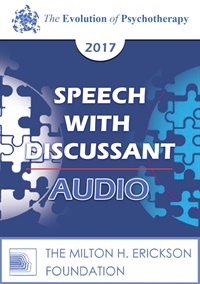EP17 Speech with Discussant 02 - The Primacy of Creativity in Effective Psychotherapy - Stephen Gilligan, PhD and Jean Houston, PhD
- Average Rating:
- Not yet rated
- Topic Areas:
- Speeches with Discussants | Psychotherapy | Art and Creativity | Experiential Therapy | Therapist Development
- Bundle(s):
- Learning Track - EP17 Erickson Download
- Categories:
- Evolution of Psychotherapy | Evolution of Psychotherapy 2017 | Evolution of Psychotherapy Erickson Learning Track
- Faculty:
- Stephen Gilligan, PhD | Jean Houston, PhD
- Duration:
- 1:28:43
- Format:
- Audio Only
- Original Program Date:
- Dec 16, 2017
- License:
- Never Expires.
Description
Description:
Therapy is successful when clients are able to experientially realize positive life changes. While the identification and transformation of symptoms is important in this regard, the activation of the client's creative capacity to change is even more important. This paper outlines 6 steps in this therapeutic process:: (1) opening a mindful field, (2) setting positive intentions, (3) developing and maintaining a creative state, (4) identifying a “storyboard” for achieving goals, (5) transforming negative experiences, and (6) everyday practices Methods and case examples will be given to illuminate this core process.
Educational Objectives:
- Demonstrate how creating new experiential realities is the primary focus of therapy.
- Identify 3 methods for developing a client's creative state.
- List three examples of how this creative state can be beneficially used.
*Sessions may be edited for content and to preserve confidentiality*
Credits
Faculty

Stephen Gilligan, PhD Related Seminars and Products
Stephen Gilligan Ph.D., is a Psychologist in Encinitas, CA. He was one of the original NLP students at UC Santa Cruz; Milton Erickson and Gregory Bateson were his mentors. After receiving his psychology doctorate from Stanford University, he became one of the premier teachers and practitioners of Ericksonian hypnotherapy. This work unfolded into his original approaches of Self-Relations and Generative Self, and then further (in collaboration with Robert Dilts) into Generative Coaching. These different traditions have all been updated and integrated into the present Generative Change Work, which includes the applications of Generative Coaching, Generative Psychotherapy, Generative Trance, Hero’s Journey, and Systemic Change work.

Jean Houston, PhD Related Seminars and Products
Jean Houston, Ph.D in Psychology, is the author of over 30 books in the fields of human and social development. As a consultant to UN programs and other international agencies she has worked in some 109 countries, and continues to advise globally in social artistry (human development in the light of social challenge and change). Jean is also Chancellor of Meridian University, Co-Founder of Rising Women, Rising World.


